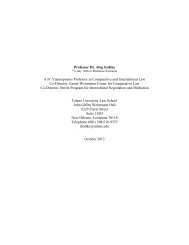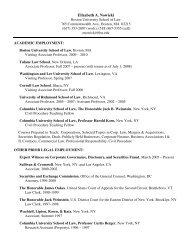Civil Codes of Louisiana - Tulane Law School - Tulane University
Civil Codes of Louisiana - Tulane Law School - Tulane University
Civil Codes of Louisiana - Tulane Law School - Tulane University
You also want an ePaper? Increase the reach of your titles
YUMPU automatically turns print PDFs into web optimized ePapers that Google loves.
Winter 2008 The <strong>Civil</strong> <strong>Codes</strong> <strong>of</strong> <strong>Louisiana</strong> 12<br />
commercial laws in force and a system <strong>of</strong> the practice to be observed before the<br />
courts.<br />
33 The committee completed its work speedily, and on March 22, 1823,<br />
presented to the legislature drafts <strong>of</strong> a <strong>Civil</strong> Code, a Code <strong>of</strong> Practice, and a Code<br />
<strong>of</strong> Commerce. After elaborate consideration and discussion, the <strong>Civil</strong> Code and<br />
the Code <strong>of</strong> Practice were adopted by the legislature on April 12, 1824. The<br />
Commercial Code was rejected, apparently on the theory that commercial law<br />
ought to be uniform for the entire United States.<br />
B. Sources <strong>of</strong> <strong>Law</strong><br />
34 The redactors <strong>of</strong> the 1825 Code followed the French <strong>Civil</strong> Code closely and<br />
relied heavily on French doctrine and jurisprudence. In their projet, which was<br />
reprinted by the legislature in 1937 and is readily available, the redactors took<br />
care to identify the sources <strong>of</strong> most proposed amendments, deletions, and<br />
additions, and commented on the reasons that prompted them to act. 27 They drew<br />
freely from the treatises <strong>of</strong> Domat, Pothier, and Toullier, but, at the same time,<br />
paid attention to the Digest <strong>of</strong> Justinian, the Siete Partidas, Febrero, and other<br />
Spanish materials. Even so, the Code <strong>of</strong> 1825 contains for the most part<br />
provisions that have an exact equivalent in the French <strong>Civil</strong> Code. 28<br />
35 Deviations from the French model occurred frequently with respect to<br />
definitions and didactic materials in general, which were kept to a minimum in<br />
France. While, according to the better view, these materials have no place in a<br />
legal text, their inclusion in the <strong>Louisiana</strong> <strong>Civil</strong> Code <strong>of</strong> 1825 was, perhaps, a<br />
practical necessity due to the scarcity <strong>of</strong> coherent doctrinal works.<br />
C. Repeal <strong>of</strong> Prior <strong>Law</strong>s<br />
36 The <strong>Civil</strong> Code <strong>of</strong> 1825 was printed in both French and English and<br />
acquired the force <strong>of</strong> law on June 20 <strong>of</strong> that year (June 15 in West Feliciana<br />
Parish). The new <strong>Civil</strong> Code was not merely an amendment <strong>of</strong> the 1808 Digest.<br />
It was an all-inclusive piece <strong>of</strong> legislation, intended to break definitively with the<br />
past. It provided in Article 3521 that “the Spanish, Roman and French laws,<br />
which were in force in this State, when <strong>Louisiana</strong> was ceded to the United States,<br />
and the acts <strong>of</strong> the Legislative Council, <strong>of</strong> the legislature <strong>of</strong> the Territory <strong>of</strong><br />
27 The <strong>Louisiana</strong> <strong>Civil</strong> Code <strong>of</strong> 1825 was much more comprehensive than the 1808 Digest. It<br />
contained 3,522 articles, about one and one-half times more than the 1808 Digest. There were<br />
more than 423 amendments to the 1808 Digest, 1746 additions to it, and 276 deletions from it.<br />
About sixty percent <strong>of</strong> the amendments and <strong>of</strong> the new provisions were taken from French<br />
treatises and an additional fifteen percent from the French <strong>Civil</strong> Code.<br />
28 Pr<strong>of</strong>essor Pascal maintains that the adoption <strong>of</strong> the 1825 <strong>Civil</strong> Code did not work any wholesale<br />
abandonment <strong>of</strong> Spanish institutions and rules. Many were changed in particulars, but there is<br />
convincing evidence for “the basic assumption that the character and thrust <strong>of</strong> the Spanish-Roman<br />
laws were being retained unless better rules could be found or devised.” Pascal, Sources <strong>of</strong> the<br />
Digest <strong>of</strong> 1808: A Reply to Pr<strong>of</strong>essor Batiza, 46 TUL. L. REV. 603, 627 (1972).<br />
Vol. 1 CIVIL LAW COMMENTARIES Issue 1





